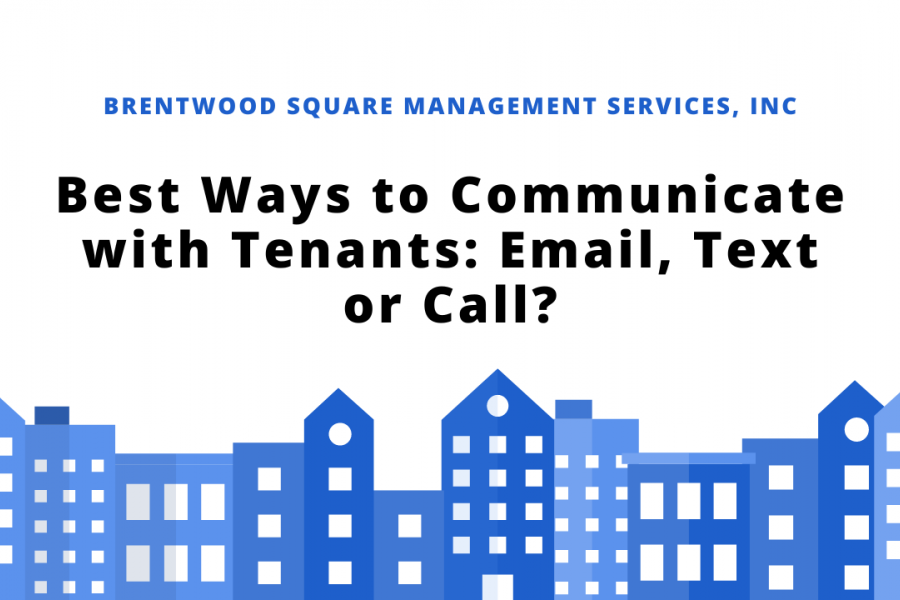
First-time landlords and even long-term ones often wonder which communication method is best when it comes to staying in touch with your tenants? It's a common question, and finding the right answer can make a big difference in how smoothly your rental business runs.
Good communication is key to building strong relationships with tenants, resolving issues quickly, and maintaining a positive reputation. Whether it's notifying them about upcoming maintenance, discussing lease renewals, or handling emergencies, the way you communicate can set the tone for your entire landlord-tenant relationship.
In this article, we'll explore the pros and cons of email, text, and phone calls, offering insights on when and how to use each method effectively. Get ready to learn which communication style suits you and your tenants best. Keep reading to learn more!
When To Use Email To Communicate With Tenants?
Formal Notices And Documentation
Email is an excellent method for sending formal notices and important documents. It's suitable for sharing lease agreements, rental policies, or notices to vacate. Emails offer a digital paper trail, providing both you and your tenant with a clear record of the communication. This is useful if you need to reference a specific notice or if any disputes arise.

Detailed Communication
When you need to explain something in detail, email is the way to go. It's easier to write out complex instructions, describe issues, or attach supporting documents. This can be helpful when discussing repairs, explaining rules, or outlining lease terms. The written format allows you and your tenant to review the information multiple times if needed.
Legal Compliance and Confidentiality
Email is a secure method for communicating confidential information, as it can be encrypted and stored safely. It meets legal requirements for some types of communication, making it useful when sharing sensitive information like financial details or personal data. Ensure you're using a reputable email service with encryption to protect this type of information.
Establishing Professionalism
Using email as a primary form of communication can give a professional impression. It demonstrates that you value clear and structured communication. When you take the time to write out information thoughtfully, it can build trust and respect with your tenants, showing them that you take your role as a landlord seriously.
When to Use Text to Communicate with Tenants?
Quick and Efficient Communication
Text messages are ideal when you need to communicate quickly and efficiently with your tenants. If there's a sudden issue, like a broken pipe or a security concern, sending a text message ensures your tenant gets the information immediately. It's a fast way to share updates or ask simple questions, promoting prompt responses.

Casual Conversations and Reminders
For casual conversations, like a quick check-in or a reminder about rent due dates, texts are perfect. They're less formal than emails and can feel more personal, fostering a friendly landlord-tenant relationship.
You can use text messages to send gentle reminders about upcoming property inspections, community events, or maintenance schedules.
Urgent Situations and Emergencies
In emergencies, such as a fire alarm or a critical safety issue, text messaging is a reliable way to alert tenants instantly. Because most people carry their phones with them, text messages are often read quickly, allowing you to communicate vital information without delay. This can be a crucial tool in ensuring tenant safety and quick action during emergencies.
Accessibility and Reach
Text messaging is accessible to a broader range of tenants, including those who might not have regular access to email. It works well for tenants who are often on the go, as texts can be read and responded to more easily from a mobile device. This makes it a great communication method for urgent or time-sensitive matters.
When to Use Call to Communicate with Tenants?
Immediate and Personal Interaction
Phone calls are best when you need immediate and personal interaction with your tenants. They are suitable for discussions that require a back-and-forth dialogue, allowing you to address concerns or answer questions in real time. This direct communication helps build rapport and trust with your tenants, as you can convey tone and emotion through your voice.

Complex Issues and Problem-Solving
If you're dealing with complex issues or need to solve a problem collaboratively, phone calls are ideal. They allow you to explain situations in detail, discuss multiple options, and work toward a resolution together.
Building Relationships and Addressing Concerns
Phone calls are an effective way to build relationships with tenants. They allow you to establish a personal connection and demonstrate that you value their concerns. This method is especially useful at the beginning of a tenancy, during lease renewals, or when addressing significant changes to the property or rental terms.
Emergency Situations
In emergency situations, phone calls can be the quickest way to communicate. If there's a safety issue, urgent repair, or other critical matter, a call ensures that your tenant receives the information immediately. It also allows you to coordinate responses and give detailed instructions if necessary.
Bottom Line
In summary, the best way to communicate with tenants—whether by email, text, or call—depends on the context and urgency of the message. Email is great for formal communication, text for quick updates, and calls for personal interaction and emergencies.
At Brentwood Square Management Services, Inc., we understand that effective communication is key to a successful rental property. We offer tailored communication strategies to help you maintain strong landlord-tenant relationships, ensuring smooth operations and happy tenants. Contact us today to learn how we can support your communication needs.
